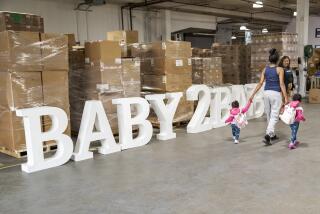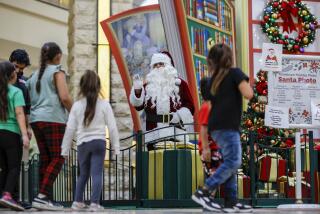St. Nixed
- Share via
Ho--beep! Ho--beep! Ho--beep!
Forget the middleman, that jolly old gent formerly known as Santa Claus. Forget letters to the North Pole. In a new take on the bridal or baby registry, Toys R Us, the world’s largest toy retailer, is zeroing in on the kiddie Christmas trade.
Here’s how it works: A kid goes to any Toys R Us, registers and gets an identifying number that’s fed into the computer. Then the kid is turned loose with a scanner, which resembles a telephone headset, to advance on the aisles.
With each zap of a bar code, the kid tells computer central what’s on his or her Christmas wish list. Zap! Talk With Me Barbie. Zap! Tamagotchi--the Virtual Reality pet. Zap! Tickle Me Elmo.
“We hope it saves a lot of people a lot of grief the day after Christmas,” says Rebecca Caruso, spokeswoman at Toys R Us corporate headquarters in Paramus, N.J. “What we’ve heard so far overall has been quite positive.”
She adds: “We had a lot of requests from parents and grandparents over the years. There is just an amazing number of different toys on the market right now. It’s difficult to know what the virtual pet is, the latest hot wheels . . . .”
As a sales ploy, “What they’re doing is quite clever,” says Gavan Fitzsimons, an assistant professor of marketing at UCLA. “It essentially creates a Christmas list but does so all at Toys R Us.”
But, he says, it may--or may not--reduce post-Christmas returns, as children’s desires are notably fickle. Indeed, “it may lead to increased returns. Say the kid scans 50 toys--now you simply get a list of 50 different toys with no preferences.” As a child, he says, “I would have scanned about 10,000 different toys with very little regard for which would be first on my list.”
“I haven’t had a complaint so far,” says Bill Willis, director of the Culver City Toys R Us, which installed scan-a-Santa in September. “The convenience is so tremendous.” In-store posters and commercials are promoting it as just that: “The gifts kids want plus convenience grown-ups love!”
A parental OK is required for a child to register, and, Willis says, most kids are accompanied by an adult as they make the rounds of the store zapping away. It’s a task that takes the average family about two hours, he says, though, “one family came in
around 1 and around 5 I ran into them still walking the store.”
The gift registry kit that’s part of the deal includes three sheets of tear-off cards for the child to pass along to aunts, uncles, grandparents and others, informing them that he’s in the Toys R Us computer--hint, hint. The gift givers then need only present themselves at the nearest Toys R Us and ask for the little darling’s computer printout.
At the Culver City store, one child’s list filled 18 printout pages. Willis says the scanner “will just register and register and register until they get tired or the parents say, ‘That’s enough.’ ”
As a toy on the list is purchased at any of the 683 Toys R Us stores in the United States or Puerto Rico, the computer duly notes it. Every Nintendo 64. Every Sony Playstation. Every Sing & Snore Ernie.
“It really cuts down tremendously on duplication,” Willis says. “It simply eliminates the guesswork,” Caruso says. “Children are still surprised at what they get.”
But Los Angeles child psychologist Robert R. Butterworth is ambivalent about what he calls this “computerized ho-ho-ho.” As he sees it, there’s “almost a sense of entitlement” when “it’s made too easy for kids to get things.”
He adds: “What we’re doing, we’re taking the mystery and fun out of the holiday. At least they could have been nice enough to dress up a robot as Santa.”
But, Butterworth says, the gift registry does fill a need, “especially now with so many broken homes. . . . Regardless of whether we like it or not, I guess we better get used to it.”
For the bah-humbuggers, he observes, “This is probably the most P.C. A computer doesn’t offend many folks and really takes the whole Santa issue out of the picture.” (His research shows that most children under 7 do believe in Santa, and, for his part, he sees nothing wrong with Santa, the Easter bunny or the tooth fairy at that age.)
Another giant toy retailer, Manhattan-based F.A.O. Schwarz, with 38 U.S. stores (including ones at South Coast Plaza and Glendale Galleria), has no computerized toy registry.
“It sounds like fun,” but doesn’t fit this retailer’s image, says corporate public relations manager Kelly Disque. “Even though we sell toys, we are sort of in a different category. We have been around for 135 years, and 30% of our merchandise is exclusive to F.A.O. Schwarz. . . . People look to us for things you don’t walk down the aisles of a grocery store and find.”
Janet Koerner, executive director of the Des Monies-based American Specialty Toy Retailing Assn., which represents independent toy sellers nationwide, says a number have gift registries, but she knows of none with the technology for “zapping around the store.” Besides, she notes, member stores go in for educational toys.
“We don’t have hot toys,” those likely to be on kids’ lists because they’ve been heavily promoted, she says.
When a child comes to Toys R Us, that child is likely to have been blitzed with commercials for the latest must-have toy. When he gets hold of that scanner, what of the greed factor? As a father of three, hearing about scan-a-Santa, asked, “Does the scanner beep when the kid picks something the parents can’t afford?”
Says UCLA’s Fitzsimons, “I honestly don’t know how different it is from making a list and sending it to Santa. You could certainly handle a child’s visit by saying Santa only has so many gifts to give, so pick five you like.”
“I think it’s a positive,” says Dave Siegel, general manager of Cincinnati-based Small Talk, a company that consults on children’s marketing and advertising. “The biggest concern at Christmas is knowing what the child wants. Especially for the grandparents, I see it as a very big plus.”
It’s up to the parents, agrees Siegel, to place limits, as it always has been.
“I think it’s great marketing. Kids know what they want today,” and working parents, with limited shopping time, “want to make sure they bring the right things home.”
As Siegel says goodbye, he quips, “I’m going to Toys R Us right now and register.”
More to Read
Inside the business of entertainment
The Wide Shot brings you news, analysis and insights on everything from streaming wars to production — and what it all means for the future.
You may occasionally receive promotional content from the Los Angeles Times.










